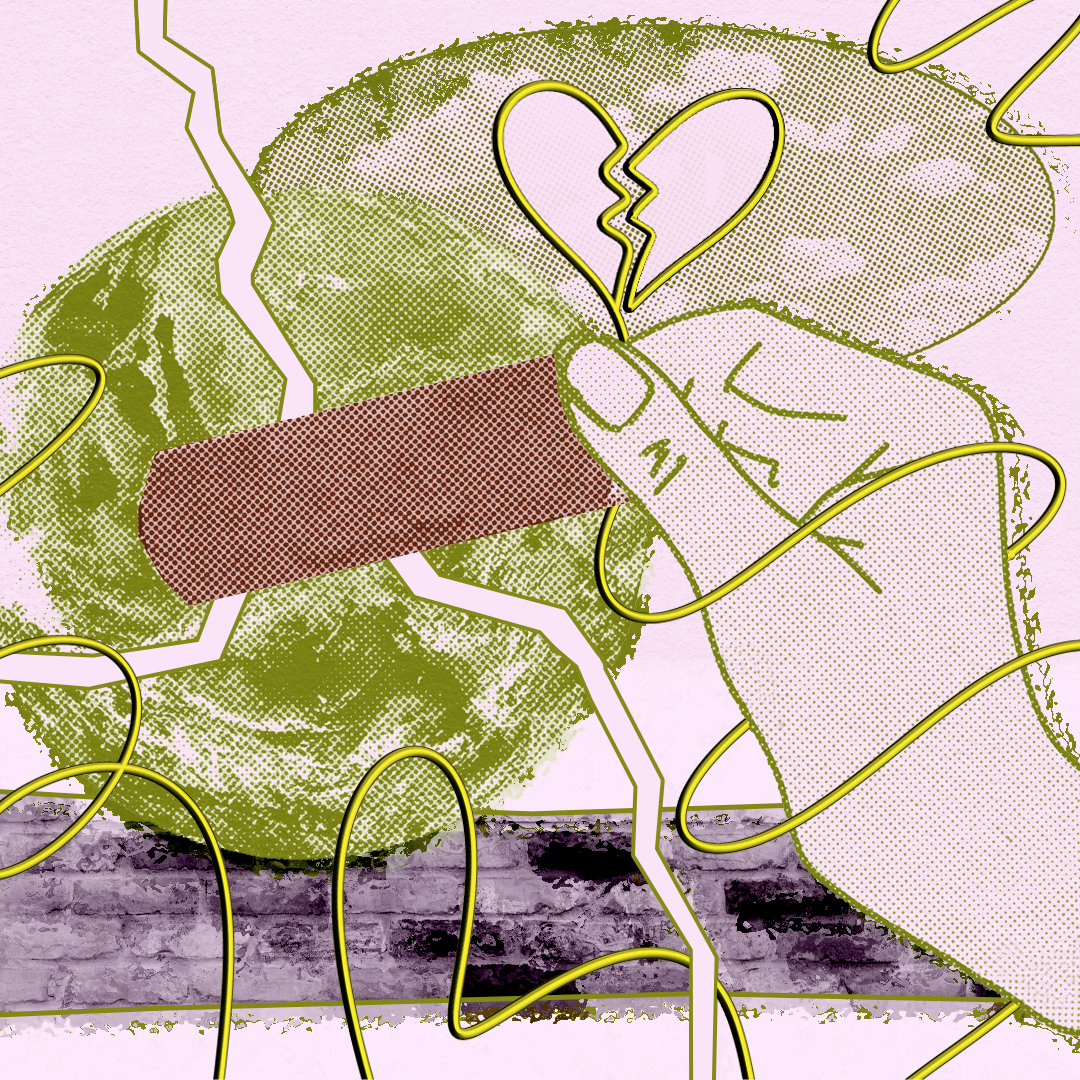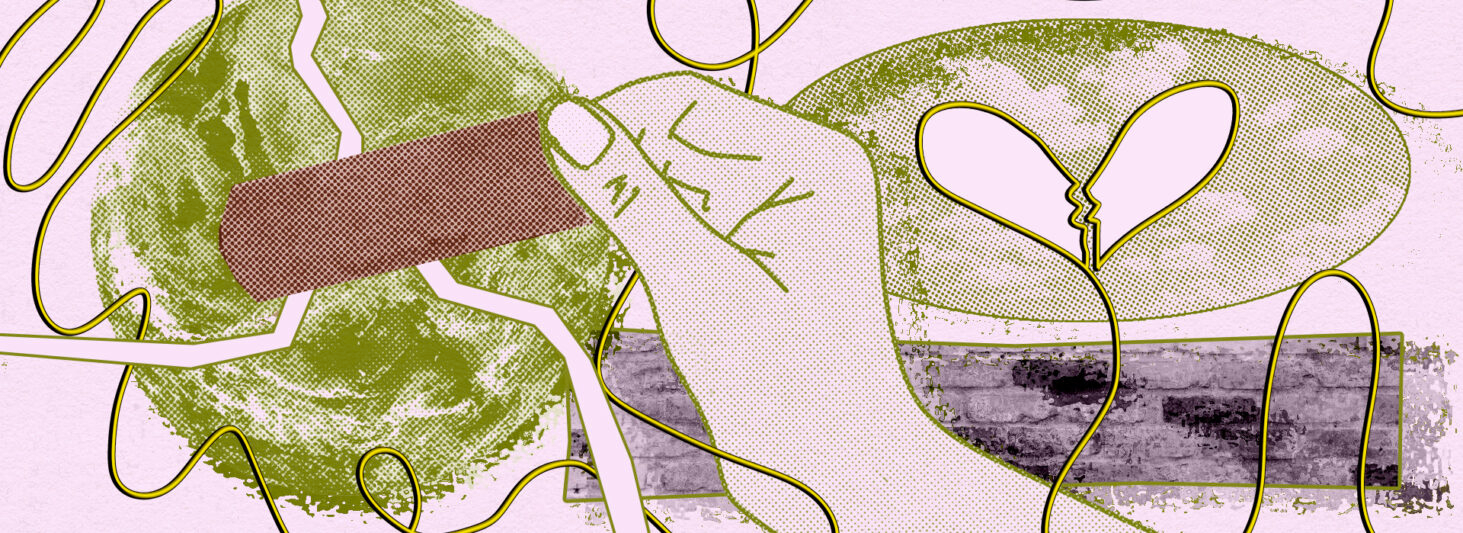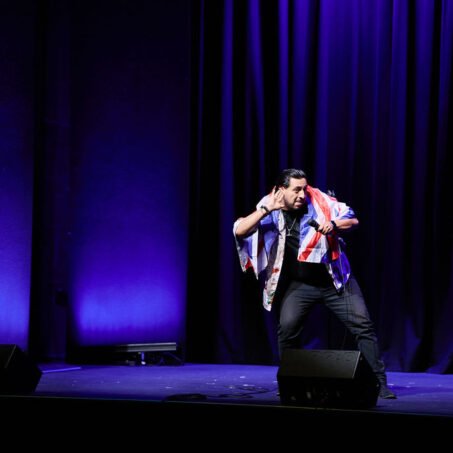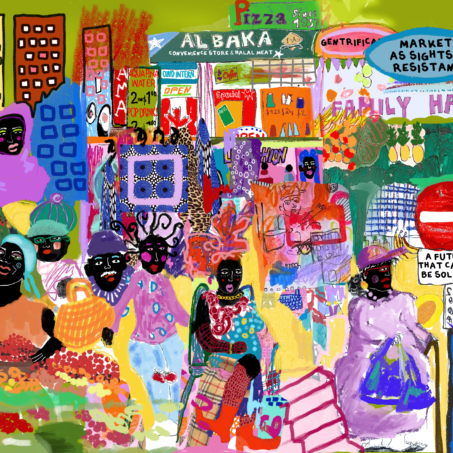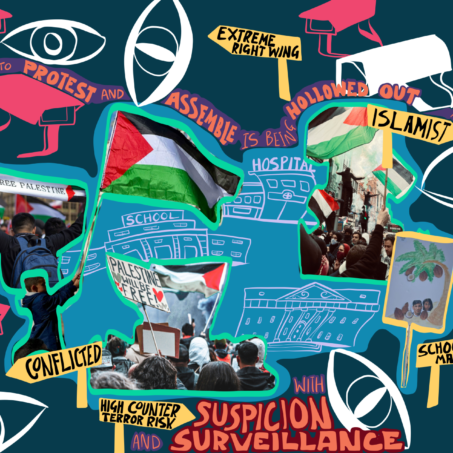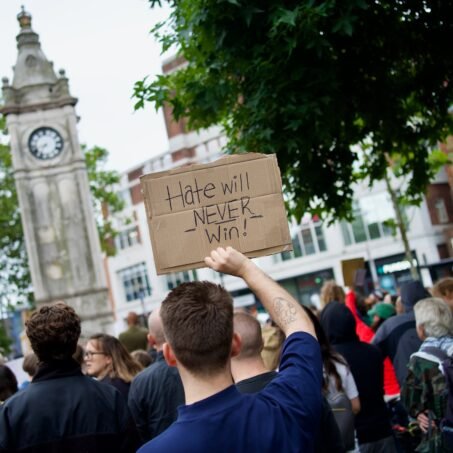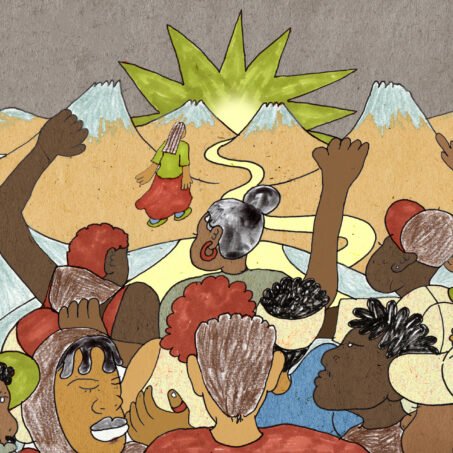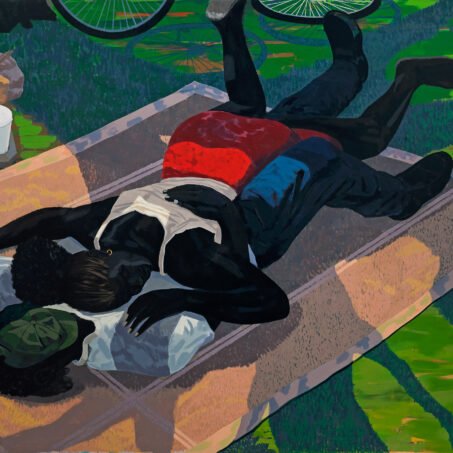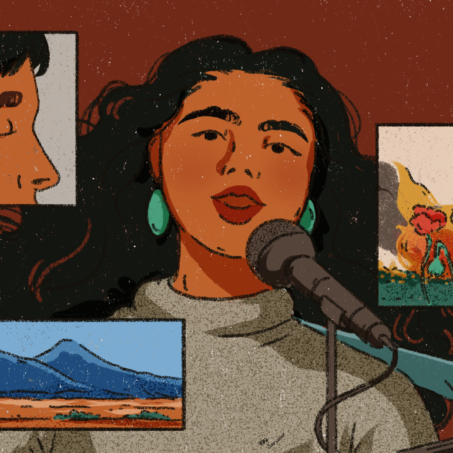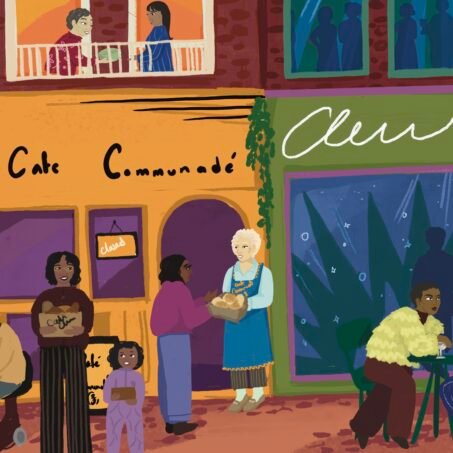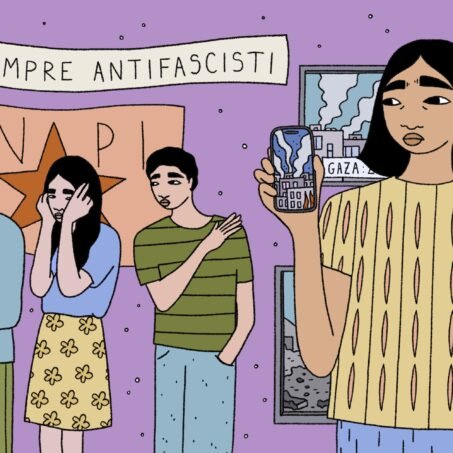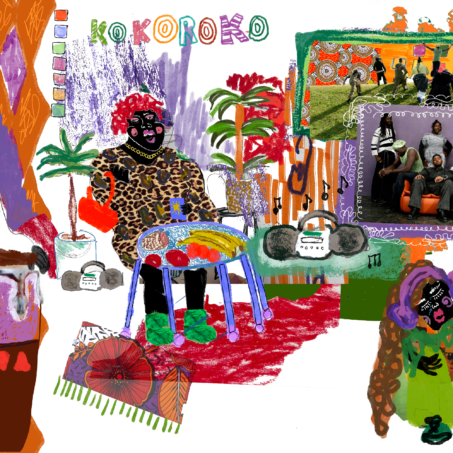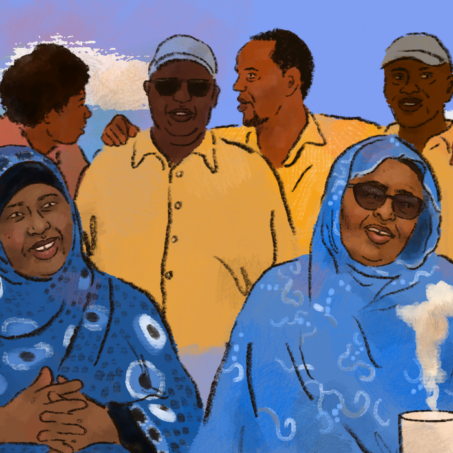Globally, we are navigating a series of interrelated crises. Colonial legacies of violence, oppression and extraction are interwoven in the present, from ecological collapse to the ongoing struggle for liberation in Palestine. In the last year alone, the UK government’s succession of cruel policies have included the erasure of migrant rights and a clampdown on our ability to protest.
“This work involves constant heartbreak,” Amber Caldwell admits to me as we catch up over Zoom. Amber is the co-founder and operations director at MAIA – a Birmingham-based organisation that explores culture as a strategy to imagine a world towards liberation. I’m speaking with Amber and Grace Barrington, a storyteller at MAIA, on a grey Thursday afternoon.
Our individual fatigue is apparent, even online, and though I don’t know the details of theirs, I can recognise its shape. Doing the work they do, the kind that requires continuous confrontation with injustice, can cause a certain feeling of powerlessness; a capitulation to despair.
Organisations like MAIA, though beginning with this state of grief, don’t keep us there. Their work on the imagination, as a critical tool for reshaping the world around us, acts as a route out of a reality that may seem inescapable.
“We’re saying that this current paradigm that we’re living in is killing us, is killing the planet, it’s hurting our people. Surely we can start to imagine a better way of being together?” Grace says.
The words “imagination” and “dreaming” may appear as flimsy placeholders or abstractions for the “practical” work that we associate with more traditional settings like policy-making. However, the call to imagine otherwise is a charged task. It’s a challenge to refuse seemingly immutable systems of oppression as the only reality available to us. To go even further, and widen the scope of what actions and futures therefore become possible.
Imagining alternative worlds and futures
Earlier this year, MAIA convened Space in the Black Imagination, a mix of workshops, panels and talks that took place online and in person. Over a series of days between May and July the lab invited artists and practitioners to explore with participants the possibility of creating infrastructure and sanctuaries rooted in themes such as radical hospitality and more-than-human accountabilities.
For example, a workshop with Nabil Al-Kinani, of Privatise the Mandem, explored the concept of hood futurism – a way of reimagining social housing estates as places where collective interest can be preserved and advanced. Another with the writer Tony Patrick engaged people in designing their dream world, using ABUELOS – an artist-led hotel that MAIA is prototyping – as a starting point.
Now, their new “Residency for Fugitives extends invitations to artists and practitioners “actively resisting the supremacist defaults of capitalism to world build from different precedents”. This project, and MAIA’s ethos more generally, draws on what the writer and intellectual Bayo Akomolafe has offered as “trickster” approaches to navigating the multiple crises of our time. So that rather than replicating the harms of a system in the urgency to meet these crises, we instead partake in actions that might seem absurd. Like slowing down and resting, when our body tenses to respond. Like embracing pleasure. Like, for Grace, “creating something that feels radically different and getting off the wheel altogether.”
Sitting in the complexity
The fact that everyone who works at MAIA has a creative background is not just useful, but deliberate. “There’s a world-building that happens in spaces with artists,” Amber explains. “One of the main things we want to focus on as an organisation is creating that capacity to imagine and build infrastructures that affirm life.”
Having worked in policy-orientated spaces, where particular structures, hierarchy and precedence dictate what is possible within the work, I’ve often wondered how artists help us to break outside of rigid frameworks. Grace’s role as a storyteller for example, brings a depth and energy to how we think of more common roles like communication and marketing. She shares that though a lot of her work involves communicating and telling the story of the organisation, she also does “a lot of producing, working with artists and holding different relationships. Connecting to this work has been a transformative and medicinal experience”.
A former dancer, Amber co-created MAIA with Amahra Spence – an artist and CEO of the organisation In 2013, the two friends came together to create a community with and for other artists struggling to find work. Through sharing their experiences they began to understand that rather than personal problems, they were all confronting a hostile environment unable to support them creatively and financially.
MAIA is now celebrating its 10 year anniversary – an impressive feat for a Black-led organisation given the impact of austerity and successive cuts to the UK’s funding infrastructure. Despite their endurance and achievements, Amber is adamant about not romanticising what it means to run an organisation. She shares “It’s not easy to sustain… especially when we’re playing with different ways of operating and experimenting with new operational structures, new types of relationships and of being together”.
There are days when the folks at MAIA would prefer to step out of this work, especially for those with lived experience of the issues they are grappling with. That part of their funding now comes from the state is also a harsh reminder of their begrudging, but existing complicity within the same systems they seek to dismantle.
There’s something about this bind that I find both bleak and galvanising in its resonance. It’s a surrender to the imperfection of this kind of work and the paradoxical negotiations we might always have to navigate. However it’s also a reminder that while we may never reach utopia, we can still move towards something better than here.
The force of constellations
MAIA regularly collaborates with a range of practitioners, artists, academics and visionaries. In June, they participated in Life Affirming Infrastructures – a panel discussion with members of Kin Structures, RESOLVE Collective, Civic Square and Healing Justice London (HJL). The conversation reflected their individual and collective efforts to create models and projects the oppressive frameworks in areas from the built environment to our national health systems.
On collaboration, Grace believes that “the change happens from lots of different people working in different directions but in solidarity. The thing that is affirming at the moment is this constellation of people around us doing different types of work that are steeped in the same values.” Without acknowledging this, it becomes difficult to reimagine such spaces as beginning points of liberation.
Working within this constellation allows MAIA to be intentional in their relationship to scale. They adopt adrienne maree brown’s concept of “fractals” – infinitely complex patterns made by smaller shapes that repeat themselves. Fractals suggest that what we practise on the small scale affects what emerges in larger systems and structures. With this in mind, MAIA are able to see the work they do locally as one facet of a wider range of activities.
Making dreams concrete
One bricks and mortar example of MAIA’s local work is YARD, a former townhouse that has been converted into an artist space and community hub. YARD is a prototype of ABUELOS, a larger scale infrastructure they are currently fundraising to develop into a hotel. Its location in Ladywood – an area in Birmingham undergoing significant regeneration after a history of disinvestment – is complicated.
Though Ladywood has a connection to some of the team’s upbringing, they are upfront that their presence is part of a wave of gentrification that makes the community vulnerable to displacement. Reflecting on the frustration of building community spaces within the context of developer-led regeneration, Amber shares that “whilst not always easy but our intention in being here is to make sure that we’re here for and with the community that exists now and prior to this development.”

Join our mailing list
Sign up for shado's picks of the week! Dropping in your inbox every Friday, we share news from inside shado + out, plus job listings, event recommendations and actions ✊
Sign up for shado's picks of the week! Dropping in your inbox every Friday, we share news from inside shado + out, plus job listings, event recommendations and actions ✊
In embedding itself into the wider community, YARD seeks to be a place where they can respond to some of the scarcity in the city while building capacity and practising mutuality. FOR MAIA, “YARD is a site to test out transformative organising structures, and explore how cultural programmes can mobilise energy towards liberation”.
The project calls to mind the work of the artist Theaster Gates, who has taken abandoned spaces in the South Side of Chicago and transformed them into community and artistic projects. One of Gates’ examples of this is The Stony Island Arts Bank – a formerly vacant and deteriorating building that is now home to an archival collection and a programme of contemporary art and exhibitions. Both YARD and Stony Island reflect the importance of hyperlocal actions in building models that rely on a way of looking and understanding the needs and aspirations of a community.
By the time Amber, Grace and I finish speaking, there’s a shift. Our fatigue hasn’t left us, but there is something else present. A certain animation, and reminder of what it means to be in spaces, even digital, where we get to speak about our dreams. Maybe this is what artists and cultural workers offer us: another way of being and seeing so that even in our despair we can attend to our collective needs. In this way liberation is not merely an imagined place in the distance but also a way of being held and expanded in the present.
What can you do?
- Read: Radical Hospitalities, a zine commissioned by MAIA
- Watch: Life Affirming Infrastructures, a panel discussion between Amahra from MAIA, Imandeep Kaur from Civic Square, Arman Nouri from Kin Structures, Farzana Khan from Healing Justice London and Akil and Seth Amani Scafe-Smith from RESOLVE Collective
- Look back at: Rehearsing Freedoms Festival, a month-long, multi-site festival of community health, healing, movement building, arts and culture initiated by Healing Justice Ldn.
- Listen to: Bayo Akomolafe and Ayana Young on the For the Wild Podcast
- Other articles you might find interesting:
